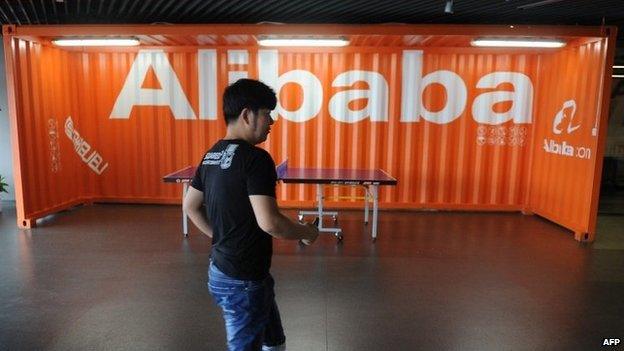Hong Kong 0, New York 1?
- Published
- comments

Hong Kong has seemingly lost the biggest IPO since Facebook. The loss, though, may do more to bolster Hong Kong's reputation in the longer term.
China's Alibaba, the world's largest e-commerce company, has reportedly ended talks with the Hong Kong Stock Exchange and will try to list in New York.
Think of Alibaba as Amazon, eBay, PayPal and Groupon all rolled into one. Its initial public offering could be bigger than Facebook, whose IPO valued it at $104.2bn (£65.2bn).
Alibaba's profits are 10 times that of Facebook, but it may be wary about repeating Facebook's post-IPO dive. Analysts estimate that it could be priced at $120bn or as low as $60bn - that is about 84 times estimated 2012 net income.
Alibaba was seeking an arrangement that would have allowed the executives to control a majority of board seats. So the founder Jack Ma with 7% of shares and his executives, who together hold about 10%, could have appointed five of the nine directors on the board.
Retaining control with a minority of shareholding is not allowed in Hong Kong in order to protect ordinary shareholders.
Dual class shares or other such arrangements where founders can retain control of a company is permitted in the US. Thus it looks like Alibaba is headed to New York unless talks can be revived.
It looks like the Hong Kong regulators stuck to their guns despite the risk of losing the listing. It is no doubt a blow, as Hong Kong is where large Chinese firms have listed since they were permitted to sell shares overseas. For instance, Alibaba's biggest competitor, Tencent Holdings - which is Facebook, Twitter, Zynga, and Tumblr all on the same platform - trades in Hong Kong.
But Hong Kong may be more worried about its longer term reputation.
By making an exception for Alibaba and allowing minority shareholders to control the company, a slew of Chinese companies would have followed.
Of the 2,500 companies that are listed on China's stock exchanges in Shanghai and Shenzhen, just a quarter or about 600 are private firms. The rest are state-owned with a minority of shares that are listed and can be publicly traded.
Hong Kong could have faced a large influx of Chinese state-owned firms that could have been overwhelming for the bourse. After all, Chinese state-owned firms are about half of the biggest companies in the world.
The ability for the state to retain control with a minority equity ownership would have proved attractive for some of the state-owned enterprises. But for shareholders in Hong Kong and globally, it may be less so. The principle of treating all shareholders equally is what the Hong Kong regulator is protecting.
For Hong Kong, a special administrative region of China, which has a 50-year "one country, two systems" policy since being handed back in 1997 from British rule, it is important that it signals to investors how it will operate.
By saying no to Alibaba, Hong Kong seems to be saying that it will retain its prudent regulatory system and protect shareholders even if it means losing the biggest tech IPO in the world.
But the story still has a long way to run, regulators do change, and an IPO of this size will be battled over undoubtedly for some time to come.